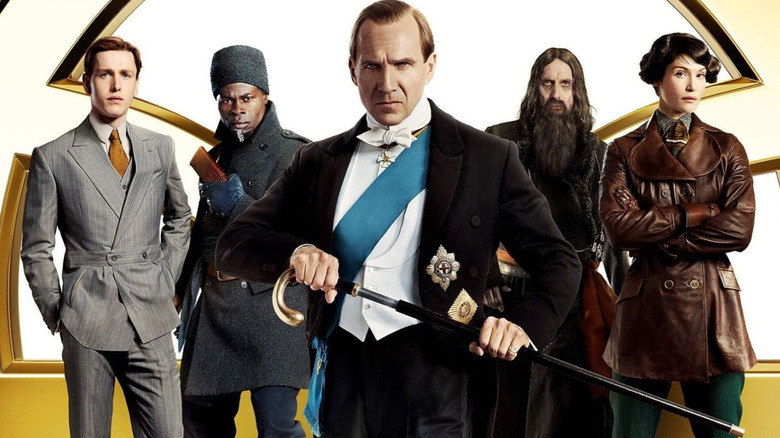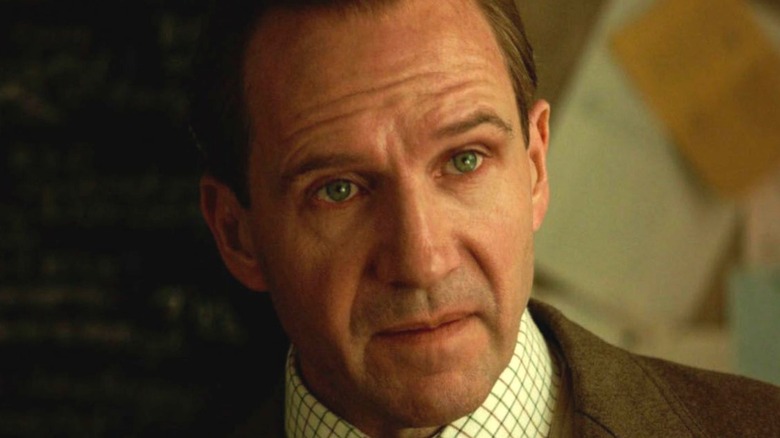The King's Man Credits Scene Explained: So You Say You Want A Revolution?
Inspired by the comic book series "The Secret Service" by Mark Millar and Dave Gibbons, and serving as a prequel to 2014's "Kingsman: The Secret Service" and 2017's "Kingsman: The Golden Circle," Matthew Vaughn's "The King's Man" is an odd amalgamation of cartoonish violence and somber melodrama. Set decades before the events of the first two films, "The King's Man" centers on several events during World War I and the establishment of the Kingsman agency. Matthew Goode's Shepherd/Captain Morton and his shadow organization have intentions to take down King George V of England and plan to start The Great War. The Duke of Oxford (Ralph Fiennes), Shola (Djimon Hounsou), and Polly (Gemma Arterton) do their best to combat Shepherd's efforts by trying to prevent Russia from leaving the war effort and attempting to convince the United States to join England's side, utilizing a spy network of leaders' hired help to procure information that could aid the cause.
"The King's Man" clumsily hopscotches through historical events of the early 20th century, complete with hyper-violent fight scenes, unsettlingly real feelings of a war drama, and occasional moments of ridiculous comedy bordering on slapstick that remind you, "Yes, this is absolutely still a comic book movie." Whether or not the decision to pivot a film series known for its tongue-in-cheek satire into a stew of mismatched tone was a good one is up to individual perspective, but the mid-credits scene sets up the franchise to go into an even more questionable direction, and we should talk about it. Obviously, massive spoilers ahead.
An Inevitable Visit from Ultimate Villany
The film ends in typical poetic justice fashion with Oxford, Shola, and Polly defeating Shepherd and the world events we all haphazardly learned in sophomore year history class still playing out as they should. Oxford reveals that he's purchased The Kingsman shop and converted the upstairs into the meeting room we recognize from the original films, the Kingsman Agency is officially established, and code names are provided based on the Knights of the Round Table. In all sincerity, the ending works quite well for a prequel and it feels like a pretty seamless transition from "The King's Man" to the existing films. That is, until the mid-credits sequence.
Kaiser Wilhelm's second in command, Erik Jan Hanussen (Daniel Brühl), has taken over as the new Shepherd and congratulates Lenin (August Diehl) for leading the revolution in Russia. Lenin promised Morton's Shepherd to be such an amazing ally he'd need to find someone equally as powerful to balance him out, so Erik brings out — you guessed it — Adolf f***** Hitler. And not just any Adolf Hitler: A ridiculously hot and young Adolf Hitler, like that "Family Guy" joke in which Ryan Reynolds is cast as "Hot-ler." If they continue the prequel story, the film will undoubtedly lead up to World War II, but considering what specifically happens in that period of history, there's some natural hesitancy to want the style of these films dipping into that era. If that's where they're heading, it's going to be real weird seeing Ralph Fiennes, famously known for playing SS war criminal Amon Göth in "Schindler's List," a Nazi in "Swing Kids," and the wizard-Hitler of Hogwarts, taking down hot Hitler.
"The King's Man" is in theaters now.

